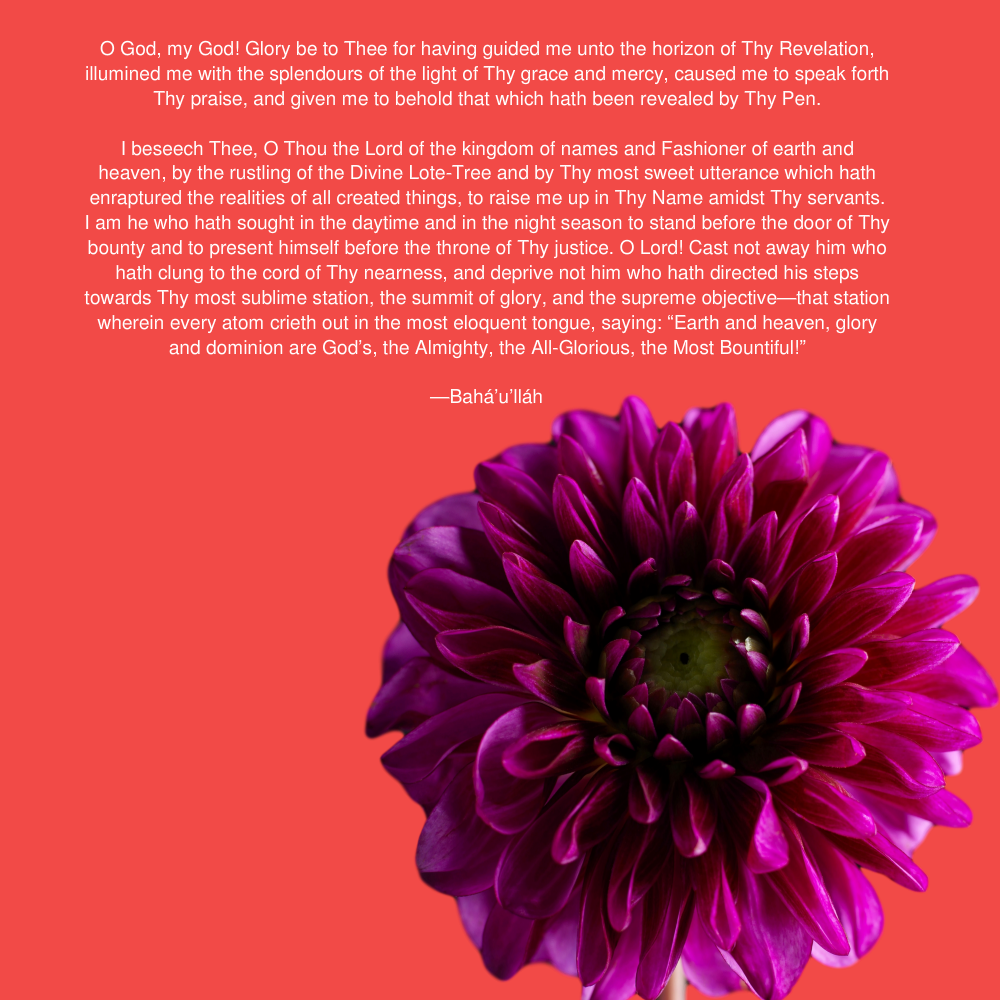To explore the profound and intricate theme of worship within the Bahá’í Faith is to embark on an expedition into the depths of the human spirit, a journey that transcends the mundane and elevates the seeker towards the Divine. But what does it truly mean to worship? What do you worship? This playful inquiry not only challenges one to introspect but encourages a broader consideration of the essence of worship in Bahá’í teachings.
Worship, in the Bahá’í context, is not confined to ritualistic acts or ceremonial gatherings. Rather, it encompasses a holistic dedication to God and the noble attributes associated with the Divine. The teachings of Bahá’u’lláh, the founder of the Bahá’í Faith, illuminate the path of spirituality intertwined with service to humanity. This dual purpose illustrates that worship is, at its core, a synthesis of devotion and action.
At its outset, one might ponder the nature of the object of worship. In the Bahá’í understanding, God is not perceived as a distant entity, but rather as an omnipresent source of love, wisdom, and guidance. The confluence of worship indeed begins with acknowledgment and reverence towards this source. We are encouraged to cultivate a profound relationship with God and to recognize the manifestations of the Divine in our everyday interactions.
One of the essential tenets of Bahá’í belief is that worship extends beyond mere adoration; it manifests itself in tangible actions. The teachings advocate for the embodiment of spiritual principles through deeds. Just as devotion is a cornerstone of worship, so too is service to others. Indeed, engaging actively in community service, promoting justice, and contributing to the betterment of society are considered acts of worship. This principle posits a challenge: can one simultaneously serve humanity while fostering a connection to the Divine?
To embrace the synthesis of worship and service is to partake in a continuous journey of spiritual growth and development. Bahá’í prayers serve as a fundamental component of this practice. They are structured not merely as verbal declarations but as transformative tools that encourage reflection, meditation, and alignment with spiritual ideals. Praying daily reinforces the individual’s connection to the Divine, fostering an environment in which love and understanding can flourish.
Moreover, the Bahá’í teachings articulate that the act of worship should foster a spirit of unity. Worship is not solely a personal endeavor; it evolves into a collective experience that ties individuals into a tapestry of shared faith and purpose. This communal aspect is both a challenge and a comfort, as it beckons adherents to embrace diversity in their communities while striving toward what Bahá’ís term the “oneness of humanity.”
This oneness presents an intriguing dilemma: as one attempts to cultivate love and empathy toward others, how does one reconcile individual differences and conflicts? The Bahá’í teachings provide a compass, guiding individuals to navigate these waters with grace. The teachings encourage a mindset of understanding and the practice of patience, essential virtues that foster harmonious relationships.
The concept of worship is further enriched by the understanding of the material world and its impermanence. The Bahá’í perspective teaches that the physical realm serves as a platform for spiritual evolution. Thus, material possessions, status, and attachments may become distractions, hindering the connection to what is significant and eternal. Engaging with the material world does not exclude one from worship; however, it requires a conscious effort to remain grounded in the pursuit of spiritual objectives, ensuring that the transient nature of existence does not overshadow the overarching goal of divine communion.
An additional avenue through which worship is expressed is through the study of sacred texts. Engaging with the writings of Bahá’u’lláh and other central figures is deemed an act of devotion—one that enriches understanding and promotes spiritual enlightenment. The continual seeking of knowledge and truth is encouraged, fostering a learner’s mindset that elevates one’s capacity for worship and broadens one’s perspectives. The intellectual pursuit itself can become an embodiment of worship, as it enhances one’s ability to contribute meaningfully to societal discourses.
Ultimately, the question remains: what do you worship? The answer lies intricately woven within the threads of individual experiences and interpretations. For some, worship may manifest through fervent prayer and spiritual rituals, while for others, it may emerge as a quiet act of kindness or an earnest pursuit of justice. Each person’s journey will illuminate a different facet of the Divine, each reflecting the unique relationship they nurture with God.
As one navigates this exploration, the dynamic interplay between worship, submission to the Divine will, and service to humanity provides both a reflective mirror and a guiding light. The Bahá’í Faith invites adherents not merely to worship in solitude but to embark on meaningful collaborations that have the power to transform communities and the broader world.
In conclusion, the essence of Bahá’í worship invites a dual commitment to both the Divine and humanity. The challenge herein lies in discovering how these elements exclusive often converge within our lives, thereby inspiring a holistic and profound engagement with both realms. What do you worship? The answer may shift and evolve, as one continues to glean insights from the eternal like a gem from the depths of the ocean, rendering worship a sacred extension of everyday existence.
